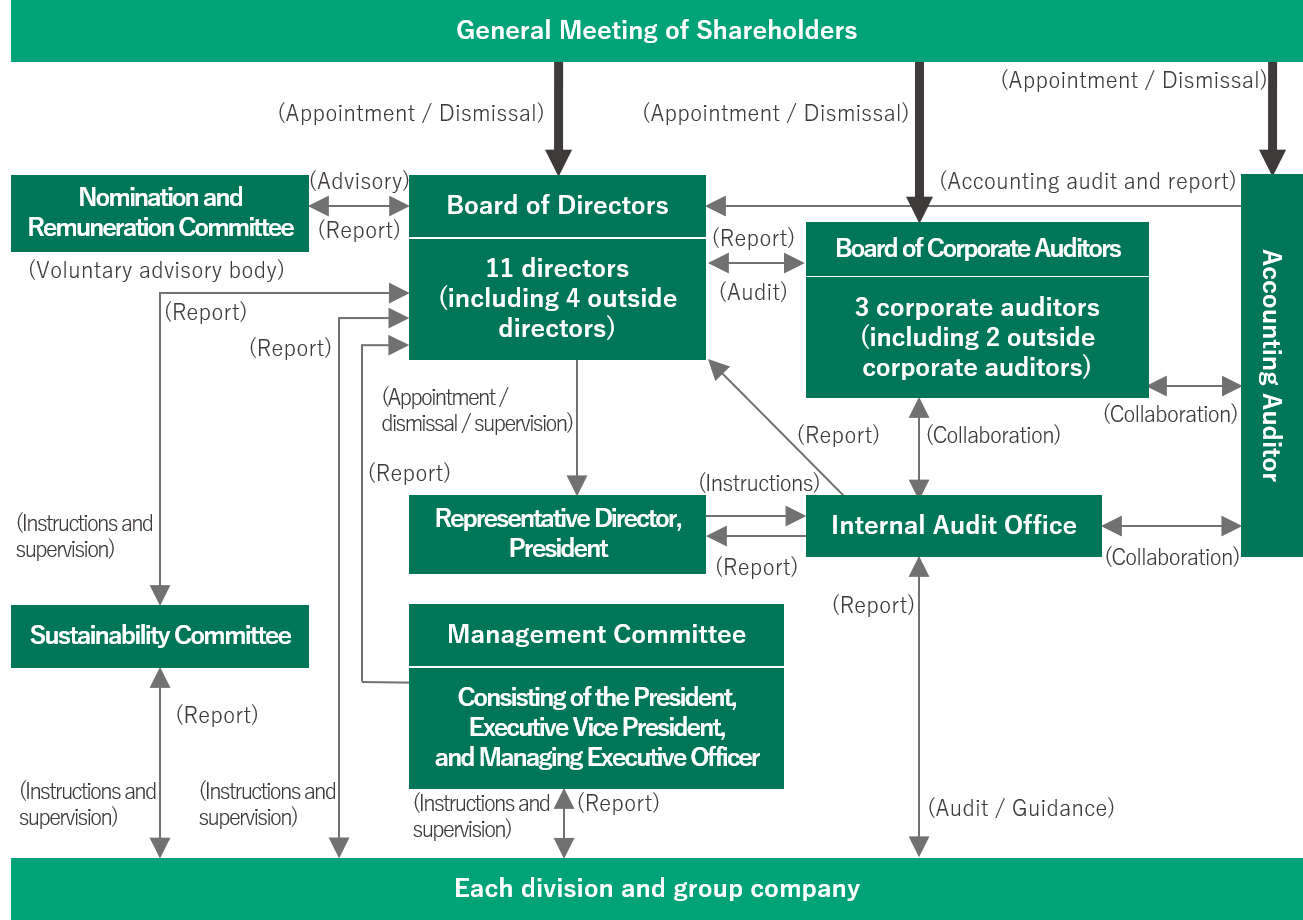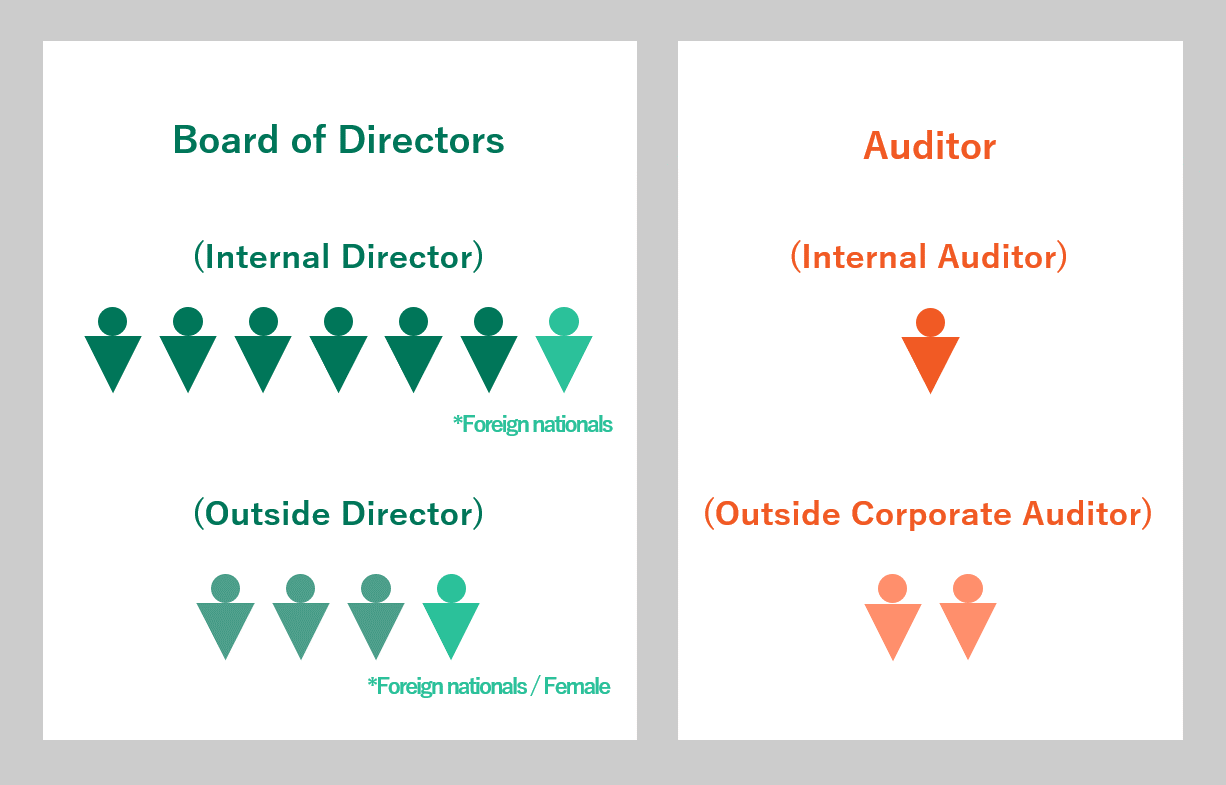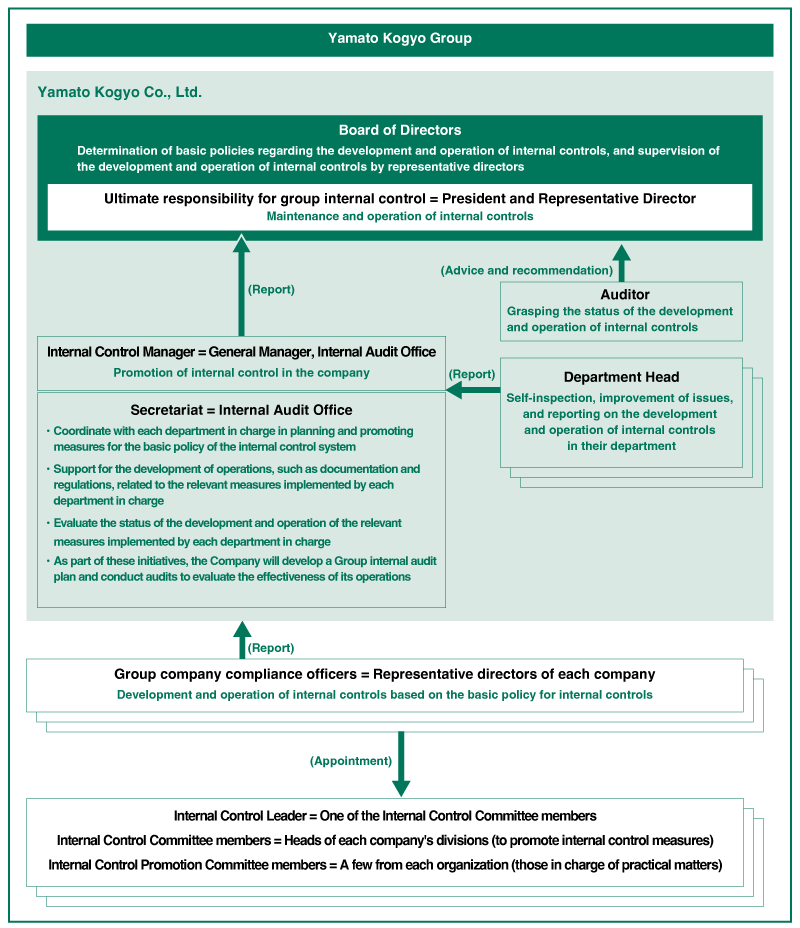
Basic Concept
The Company recognizes that corporate governance is "to clarify the fairness, transparency, and legality of corporate decision-making and responsibility systems to shareholders and society" and regards it as an important management issue. To live up to the trust and expectations of all stakeholders, we are committed to the following basic policies.
Policy
Basic Policy
Corporate Governance Structure
The Board of Directors, which includes four outside directors, makes decisions on management policies, etc., and supervises the execution of business operations, and the Board of Corporate Auditors audits the execution of duties by directors. The Company has also established the Nomination Committee and the Compensation Committee as advisory bodies to the Board of Directors to enhance corporate governance.
Members per Institution (as of July 2023) and Attendance Rate in FY2022
| Name | Independence | Board of Directors | Board of Corporate Auditors | Management Committee | Nomination Committee and Remuneration Committee | Sustainability Committee | |
|---|---|---|---|---|---|---|---|
| Chairman | Hiroyuki Inoue | 6/6 times | 1 time* | ||||
| Representative Director, President | Mikio Kobayashi | ◎ 6/6 times | ◎ 13/13 times | ◎ 3/3 times | |||
| Representative Director, Executive Vice President | Katsumasa Kohata | 6/6 times | 13/13 times | 3 times* | |||
| Director, Managing Executive Officer | Kazuhiro Tsukamoto | 6/6 times | 13/13 times | 3/3 times | |||
| Director, Managing Executive Officer | Kazumi Yonezawa | 6/6 times | 13/13 times | 9/9 times | 3/3 times | ||
| Director | Damri Tunshevavong | 6/6 times | 3 times* | ||||
| Director | Takenosuke Yasufuku | 6/6 times | 8 times* | 2/3 times | |||
| Outside Director | Kiyoshige Akamatsu | ○ | 6/6 times | 8 times* | ◎ 9/9 times | 3/3 times | |
| Outside Director | Kunitoshi Takeda | ○ | 6/6 times | 8 times* | 9/9 times | 3/3 times | |
| Outside Director | Motomu Takahashi | ○ | 6/6 times | 8 times* | 9/9 times | 3/3 times | |
| Outside Director | Pimjai Wangkiat | ○ | 4/4 times (After appointment as director) |
3 times* | |||
| Auditor | Kengo Nakaya | 6/6 times | 13/13 times | 13 times* | 3 times* | ||
| Outside Auditor | Shigeaki Katayama | ○ | 6/6 times | ◎ 13/13 times | 13 times* | 9/9 times | 3 times* |
| Outside Auditor | Mikio Nakajo | ○ | 6/6 times | 13/13 times | 6 times* |
Corporate Governance Structure

Board of Directors
The Board of Directors consists of 11 directors (four of whom are outside directors), and holds regular meetings four times a year in principle, with extraordinary meetings held as necessary. The Board of Directors monitors and supervises the status of business execution by the Directors by deliberating on matters stipulated in laws and ordinances, the Articles of Incorporation, and the Board of Directors Regulations, in addition to reports on business execution by the Directors in charge, and by exchanging questions, proposals, and opinions among the Directors. The Company's Articles of Incorporation stipulate that the Board of Directors may adopt resolutions based on written resolutions with the consent of all Directors.
Board of Corporate Auditors
The Board of Corporate Auditors consists of three members: two full-time Corporate Auditors (one of whom is an Outside Corporate Auditor) and one part-time Corporate Auditor (an Outside Corporate Auditor). In cooperation with outside directors and the Internal Audit Office, they audit the decision-making process of the Board of Directors and the status of business execution by directors.
Management Committee
It is attended by the Representative Director, President, Representative Director, Executive Vice President, and two Director, Managing Executive Officers (and related directors and corporate auditors, as necessary), and is responsible for decision-making on matters entrusted by the Board of Directors (excluding matters exclusively decided by the Board of Directors as stipulated in the Companies Act), as well as deliberating, deciding, and managing policies and plans for business execution. In addition to decision-making on matters entrusted by the Board of Directors (excluding matters exclusively decided by the Board of Directors as stipulated in the Companies Act), the Board of Directors deliberates, decides, and manages policies and plans for business execution.
Nomination Committee and Remuneration Committee
The Company has established the Nomination Committee and the Remuneration Committee as voluntary advisory bodies to the Board of Directors. The purpose of the Nomination Committee and the Remuneration Committee, as voluntary advisory bodies to the Board of Directors, is to enhance the transparency and objectivity of the decision-making process of the Board of Directors for decisions on matters such as nomination and compensation and to strengthen corporate governance. The Committee consists of three outside directors, one outside corporate auditor, and one internal director selected by resolution of the Board of Directors, and is chaired by an outside director.
Officers
The Company's Board of Directors consists of 11 directors, including four outside directors (including one foreign male and one foreign female), each with a wealth of knowledge and experience in corporate management and international business development, regardless of nationality, race, or gender, and we believe that the Board functions well as an effective Board of Directors.
The Board of Corporate Auditors consists of three corporate auditors, including two outside corporate auditors. One of the corporate auditors has sufficient knowledge of finance and accounting, and one of the corporate auditors is an attorney at law with sufficient knowledge of legal matters.
Composition of the Board of Directors and Board of Corporate Auditors

Nomination and Election Policy and Dismissal Criteria for Directors and Corporate Auditors
The policies and procedures of the Board of Directors for the election and dismissal of senior management and the nomination and dismissal of candidates for Directors and Corporate Auditors are as follows
Medium-term Sustainability Plan "Governance"
| Materiality | Item | FYE March 2026 | FYE March 2024 |
|---|---|---|---|
| Medium-term targets | Annual targets | ||
| Corporate management base | Governance |
|
|
Evaluating the Effectiveness of the Board of Directors
Every year, we conduct questionnaires (questionnaires) from each director and the corporate auditor regarding the operation of the Board of Directors and other matters, and after deliberation by outside officers, report to the Board of Directors that there are no problems with the operation of the Board of Directors and that its effectiveness is ensured.
The questionnaires to date have made recommendations on the composition of the Board of Directors, further enhancement of discussions on management policy (direction of growth strategy, etc.), and consideration of an incentive-based executive remuneration system, and we have implemented measures such as ensuring diversity on the Board of Directors, the introduction of an executive officer system, speeding up and enhancing discussions and decision-making by dividing the functions of the Board of Directors and the Management Committee and introducing performance-linked compensation, including a stock-based compensation system. We have implemented measures such as the introduction of an executive officer system, the division of functions between the Board of Directors and the Management Committee to speed up and enhance discussions and decision-making, and the introduction of performance-linked compensation, including a stock-based compensation system.
Based on the above questionnaire, we will continue to examine ways to enhance the effectiveness of the Board of Directors and further improve governance.
Ensuring Transparency and Objectivity of Executive Remuneration
The Company has established the Nomination Committee and the Remuneration Committee, which are voluntary advisory bodies to the Board of Directors, to enhance the transparency and objectivity of the decision-making process of the Board of Directors for decisions on matters such as nomination and compensation, and strengthen corporate governance. The committee consists of three outside directors, one outside corporate auditor, and one inside director selected by resolution of the Board of Directors, and the committee is chaired by an outside director.
The Company's policy regarding the determination of remuneration, etc. for Directors (excluding non-executive Directors and outside directors) is as follows.
Policy for Determining Remuneration, etc. of Directors

Fostering a Sustainability Mindset among Directors
Our Group’s major domestic companies provide opportunities for training by inviting external lecturers and participating in external seminars as necessary to help management and supervisory personnel acquire the necessary knowledge and develop a sustainability mindset.
Basic Concept
As our Group expands its business globally, there is a concern that depending on how we respond to ethical issues, not to mention legal compliance, we may have to suspend operations or significantly damage our brand and other assets. There is also a concern that we may lose the trust of society and our business partners due to a lack of compliance awareness or violations.
We have established the Employee Code of Conduct as a guideline for all employees of our Group to act with integrity based on the values and ethics required of a corporate citizen as a member of society, respecting social norms as well as complying with laws and regulations, to realize fair and sound management, to achieve harmony with civil society, and to develop the company creatively. We have established the Employee Code of Conduct as a code of conduct for the creative development of the company.
In the Yamato SPIRIT (Values and Action Guidelines) of our corporate philosophy "MISSION, VISION and Yamato SPIRIT," we have set forth fairness as one of our values. In addition, the Yamato Kogyo Group Employee Code of Conduct stipulates compliance with various business laws, severance of relations with antisocial forces, fair trade and compliance with subcontracting laws, workplace safety, and health, and compliance with labor-related laws and regulations. By thoroughly legal compliance, we show our stance of being honest and maintaining the highest level of ethical standards.
Structure
To ensure thorough compliance, our Group has established the following systems for internal control.
The President and Representative Director of Yamato Kogyo Co., Ltd. is ultimately responsible for our Group's internal controls, and the Representative Directors of each Group company are assigned as the persons responsible for their internal controls, which are implemented following the Basic Policy on Internal Controls.
The Board of Directors decides on basic policies regarding the development and operation of internal controls and is responsible for supervision. In addition, corporate auditors work with the departments involved in the development and operation of internal controls, ascertain the status of the development and operation of internal controls through audits by corporate auditors, and provide advice and recommendations to management as necessary. Department managers are obligated to conduct self-inspections, improve issues, and report on the development and operation of internal controls in their departments.
As for the management system, the General Manager of the Internal Audit Office is responsible for the promotion of internal control in his company as the person in charge of internal control, and the Internal Audit Office serves as the secretariat function for the management of internal control in our Group and promotes internal control for the entire Group. The president of each Group company appoints an internal control leader, an internal control committee member, and an internal control promotion committee member, and the head of each department serves as an internal control committee member and is responsible for promoting internal control initiatives.
System for Financial Reporting

Medium-term Sustainability Plan "Compliance"
| Materiality | Item | FYE March 2026 | FYE March 2024 |
|---|---|---|---|
| Medium-term targets | Annual targets | ||
| Corporate management base | Compliance |
|
|
Internal Reporting System
The Yamato Kogyo Group has established an internal whistleblower system based on the "Whistleblower Protection Regulations". All Group employees, including temporary and part-time employees engaged in business within the Group, as well as employees of subcontractors and suppliers, are eligible to use the system, which provides internal and external contact points in Japan.
We accept consultations and reports by telephone, e-mail, fax, writing, and visits at two contact points, inside and outside the company. The Whistleblower Protection Office of Yamato Kogyo (established within the Internal Audit Office) investigates the facts. Regardless of whether the content of the report is true or false, the investigation team will report the results of the investigation to the general manager of the Whistleblower Protection Office and the informant. The General Manager of the Whistleblower Protection Office shall promptly take corrective and preventive measures, and report the results of the investigation and corrective and preventive measures to the President and Corporate Auditors.
In addition, we protect whistleblowers following the Whistleblower Protection Act to ensure that they are not disadvantaged.
Fostering and Spreading Compliance Awareness
Our Group has formulated the corporate philosophy "MISSION, VISION, Yamato SPIRIT" and established the "Yamato Kogyo Group Employee Code of Conduct" as a guideline for realizing the philosophy and promoting compliance.
Compliance awareness is fostered and disseminated through compliance training at the time of employment and by job level, as well as through the monthly "Compliance Bulletin," sent out to all employees.
The following training programs were conducted in fiscal 2022. We will continue to examine ways to provide effective training on an ongoing basis.
Compliance Training Conducted in FY2022
| Contents of training | Period of implementation | Target group |
|---|---|---|
| Compliance training | Upon hire (scheduled training) | New employees and career hires |
| Compliance training | At the time of promotion (scheduled training) | Initial supervisors |
| Harassment training | Apr 2022 - Mar 2023 | Directors and employees |
Basic Concept
The Yamato Kogyo Group believes that when various risks surrounding its corporate activities become apparent, an appropriate response from the initial response to the conclusion of the crisis will help our Group fulfill its social responsibilities and improve the level of trust. About information sharing and communication, we have established the "Management Crisis Management Regulations" and "Crisis Information Communication Guidelines" as our basic policy "BAD NEWS FIRST" to ensure that inconvenient information is smoothly communicated from the field. We believe that fostering an open corporate culture and taking prompt and appropriate action will lead to the avoidance of risk and build trust in the Yamato Kogyo Group.
Structure
As the basis of our risk management system, we have established the "Management Risk Management Regulations”. About possible risks, the Sustainability Committee, chaired by the President and consisting of directors in charge of domestic and overseas business, presidents of domestic operating companies, and directors including independent outside directors as Sustainability Committee members, is responsible for risk management. In addition, the outside directors supervise the Board of Directors, while the corporate auditors and the Internal Audit Office identify risks and work to prevent corruption. For this purpose, we have increased the number of outside directors and assigned the Internal Audit Office as an organization directly under the president. In the unlikely event of an unforeseen event, a task force headed by the President will be established, and an information communication team and an external advisory team, including legal counsel, will be organized to swiftly respond to the situation and establish a system to prevent and minimize the spread of damage.
BCP (Business Continuity Planning) Initiatives
Our Group has established regulations on disaster response and has a system in place to respond quickly in the event of an emergency, and is working on countermeasures by conducting regular drills assuming disasters, etc. The Safety and Environment Management Department sponsors annual drills to simulate fires and earthquakes to ensure the effectiveness of disaster countermeasures.
In addition, we have established disaster prevention management regulations and have formulated and are operating response plans such as the establishment of a disaster prevention headquarters to minimize damage in the event of an actual abnormal phenomenon.